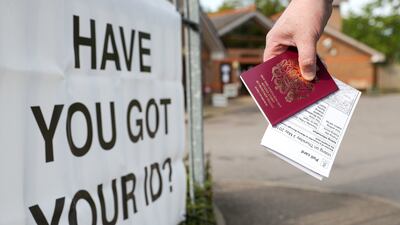New voter identification rules are coming into force in England in time for the May 5 local elections.
Previously, people registered to vote only needed to give their name and address to cast their ballot. Now they also have to bring photo ID.
And with up to 25 per cent of people still unaware of the change, critics fear the risks attached to the move outweigh the promised benefits of tackling voter fraud.
When does voter ID start?
The new law will come into force for the next elections.
For England, that is the May 4 local elections and the deadline for Voter Authority Certificate applications is Tuesday, April 26.
In Northern Ireland, voters have until May 5 to apply. Local elections there are May 18.
Photo ID has been needed since 2003, so there is little concern that voters will be caught short.
For Scotland, there are no May elections, so a picture ID will not be needed until the next UK parliamentary by-election or recall petition.
Wales also has no elections in May and so ID will be needed next time.
What about voting from abroad?
The same rules apply if a person wants to vote overseas.
From May 4, photo ID will be needed when voting in person in some UK elections or referendums.
People living abroad can chose a friend or relative to vote by proxy for them at the ballot station, or they can vote by post. If you are the proxy, you only need your ID, not that of the person you are voting for.
How to apply for the Voter Authority Certificate
Applying for the Voter Authority Certificate is free and can be done online or by post. The deadline for applications was 5pm on April 25.
Before applying, you must be registered to vote.
You will need a recent photo and your National Insurance number for the application.
If you do not have a National Insurance number, a birth certificate or bank statement will be needed to help confirm an identity.
Voting applications
The government has estimated that about 4 per cent of the population of Britain — a little more than two million people — is unlikely to have a valid form of photo ID to vote.
Since January, there have been 80,821 online applications for the certificate.
Labour and some electoral reform campaigners have called the new requirement “expensive” and “unnecessary”. They also fear it could make it harder for some voters to cast their ballot.
Six per cent of all applications have been made by people under 25, and 3 per cent came from those aged 75 and over.
Applications from 55 to 64-year-olds account for about 32 per cent of the total, followed by 45 to 54-year-olds (23 per cent), 35 to 44-year-olds (16 per cent), 65 to 74-year-olds (10 per cent) and 25 to 34-year-olds (10 per cent).
What are acceptable IDs?
- UK or Northern Ireland photo card driving licence (full or provisional)
- Driving licence issued by the EU, Norway, Iceland, Liechtenstein, the Isle of Man or any of the Channel Islands
- UK passport
- Passport issued by the EU, Norway, Iceland, Liechtenstein or a Commonwealth country
- Pass card (National Proof of Age Standards Scheme)
- Blue Badge
- Biometric residence permit (BRP)
- Defence Identity Card (Ministry of Defence form 90)
- National identity card issued by the EU, Norway, Iceland or Liechtenstein
- Northern Ireland Electoral Identity Card
- Voter Authority Certificate
- Anonymous Elector’s Document
- Some travel passes can also be used


